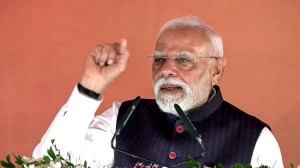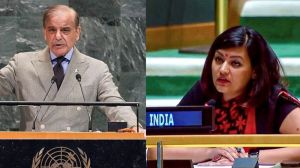Indo-Pak war of words in New York amid high millennium ideals
NEW YORK, SEPTEMBER 9: Against the backdrop of high ideals and noble declarations contained in the Millennium Declaration of world leaders...

NEW YORK, SEPTEMBER 9: Against the backdrop of high ideals and noble declarations contained in the Millennium Declaration of world leaders, India and Pakistan continued their extraordinary cold war this balmy September in New York, rejecting each others positions and offers with the cussedness of school kids arguing “you did it first.
Leaders and delegations of the two countries are staying at hotels a couple of blocks within each other, the Indians at the Waldorf Astoria and the Pakistanis at Roosevelt. But beyond the spy vs spy activity of spooks trying to find out what the other side is up to, there has been little contact between the two sides.
Instead, the two sides have been firing verbal artillery at each other through the media in the same reflexive manner in which shells are fired across border posts. While the Pakistanis are trying to come across as an aggrieved party full of sweet reasonableness, the Indians are trying to take the civilisational high road while painting Islamabad darkly as a maverick, unstable country promoting and exporting terrorism worldwide.
External Affairs Minister Jaswant Singh rejected the suggestion at a briefing on Friday that Prime Minister Vajpayee’s intense tirade aimed at Pakistan had heightened the negative atmosphere and destroyed any hope of talks. The Indian position was clear: Pakistan had to declare its commitment to the Shimla Pact and Lahore Declaration and abjure cross-border terrorism for resumption of dialogue.
The Pakistani military leadership, having repudiated the peace pacts and initiated the Kargil incursion amid universal exposure, condemnation, and infamy, find few buyers for their new avatar as peace seekers. Still, Gen. Musharraf, always in civvies, has been trying hard through a raft of interview — many more than the bilateral meetings he has been having, to project the image of reasonableness.
He is not succeeding a lot simply because the facts of the case seem to fly against his country. From Argentina to Russia to Philippines, the spectre ofterrorism, originating in the badlands of Northwest Pakistan and Afghanistan, seem to be of more immediate concern than the insurrection in Kashmir or Chechnya. As a result, the General and his country are looked upon with suspicion by the rest of the world.
Besides, the suborning of democracy is also costing Pakistan dearly in an era where freedom and enterprise are universally acclaimed values. Demonstrations by a motley coalition of disaffected and separatist elements, Kashmiris, Khalistanis, Christians, Dalits, was rendered less potent simply because of India’s credentials as a plural and democratic society.
They dissolved into a hundred other protests, leading External Affairs Minister Jaswant Singh to airily dismiss, “It’s the season of protests in New York.”
So while the General returns home over the weekend trying to convince his domestic audience that he has internationalised Kashmir, the Indians will press on to buttress their case as a rising power after the Prime Minister Vajpayee has his knees tended to by experts here. The Prime Minister looked in much better fettle last evening at a Waldorf reception, regaling the NRI community with an uplifting political discourse.
But as far as Pakistan is concerned, India has firmly turned it back on Islamabad at the risk of appearing cussed.
The game has now passed on to spin masters from both sides trying to project minor encounters and exchanges as major victories. After Gen. Musharraf bumped into President Clinton at a reception of 150 world leaders, the Pakistani media was told how solicitous Clinton was of the Kashmir issue and how much he appreciated Pakistan’s handling of the matter, a laughable claim considering the pasting Islamabad got from Washington following the Kargil incursion and the diplomatic doghouse Islamabad still finds itself in.
In fact, the General’s popularity with the media haring after a colourful story seems to be inversely proportional to his access to the world leadership. Washington has ignored him pointedly, “He has not done enough”, administration officials say, and meetings with leaders like President Putin of Russia were aimed more at addressing Moscow’s concern about terrorism.
It’s not that India has made any great headway either in New York. The Prime Minister’s suspect health had dampened bilaterals and his late arrival killedmeetings with Prime Minister Blair and President Putin among other leaders. All he managed on Friday was meetings with leaders of Nepal and Bangladesh.
The Indian spinmeisters then seized on Republican Presidential candidate George W. Bush’s phone call to the Prime Minister as the epochal event of the day. The five-minute courtesy call, which they claimed was initiated by the Bush camp, was projected as a great diplomatic coup. “He did not call any of the 150 other world leaders gathered here,” one top official boasted.





- 01
- 02
- 03
- 04
- 05


























